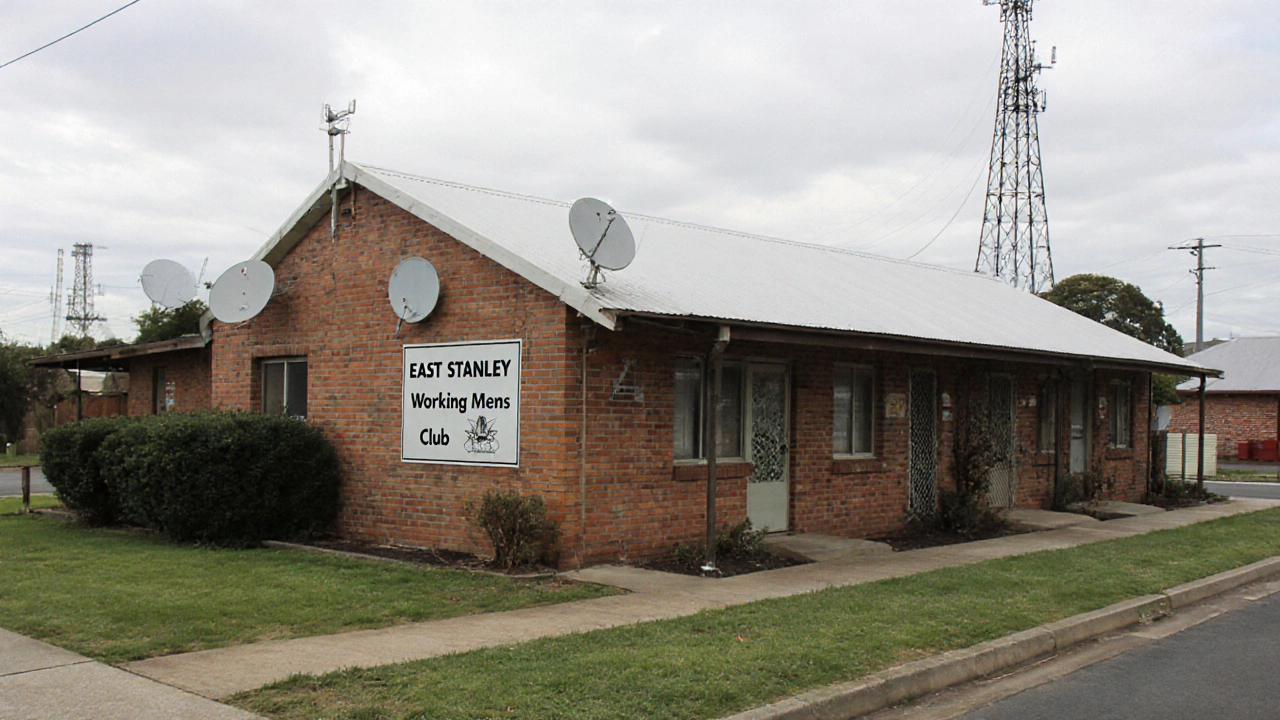When Bradley Hall Estate Agents announced on September 12, 2024 that the former East Stanley Working Men’s Club was on the market for £250,000, local residents braced for a wave of speculation about what would replace the community hub.
The single‑storey, detached masonry building, nestled on Chester Road in Stanley, County Durham (DH9), has been vacant since its doors shut in December 2023. The listing describes the structure as a “blank canvas” suitable for a variety of alternative uses, pending planning permission.
Background of the Club
Founded in the early 1950s, the East Stanley Working Men’s Club served as a social anchor for generations of miners, factory workers, and later, service‑industry staff. At its peak the club boasted roughly 120 paying members, a function hall, bar, and a small gym. By 2022, membership had dwindled to under 40, a trend mirrored across the UK’s working‑men’s club network.
The decline accelerated after the closure of the nearby Rookhope Colliery in 2021, which stripped the area of its primary employer. In a meeting held on October 14, 2022, John Wilson, then chairman of the club, told members, “We’re fighting an uphill battle against changing lifestyles and rising costs. If we can’t secure a sustainable business model, we risk losing this piece of our heritage.”
Details of the Sale
Bradley Hall’s advertisement lists the property at a asking price of £250,000, a figure that sits below comparable commercial parcels in the area, which average £340,000 per unit. The building’s flat roof and traditional brickwork are highlighted as assets for conversion into residential flats, a community centre, or even a boutique hotel.
- Location: Chester Road, Stanley
- Asking price: £250,000
- Size: Approximately 3,200 sq ft of floor space
- Planning status: Requires change‑of‑use permission from Durham County Council
- Current condition: Good structural integrity, interior stripped
According to the listing, “the property is ideal for developers looking to create mixed‑use accommodation while preserving the façade that reflects the area’s industrial heritage.”
Stakeholder Reactions
The news sparked an immediate response from the local community. Stanley Residents Association convened a special meeting on September 20, 2024, to discuss the potential impact of redevelopment. Chairwoman Emma Carter said, “We’re not opposed to new investment, but we need guarantees that any new use respects the site’s history and serves the existing neighbourhood, not just profit‑driven outsiders.”
At the same time, the constituency’s MP, Sir Richard Holden, wrote to Durham County Council asking for a fast‑track review of any planning applications that include affordable housing components.
Potential buyers have already emerged. On September 23, a representative from North East Developments Ltd. contacted Bradley Hall, indicating interest in converting the site into a “mixed‑use hub with 12 affordable flats and a community space on the ground floor.” The developer cited the property’s proximity to the A690 and the upcoming Stanley Transport Interchange as key selling points.

Potential Redevelopment Plans
Under current UK planning policy, a change of use from “social club” to “residential” falls under “Category C3 – residential dwellings.” Durham County Planning CommitteeDurham County Council Offices is slated to consider any applications in mid‑October.
Experts suggest three plausible pathways:
- Residential conversion: The most financially attractive option, likely yielding 10‑12 two‑bedroom units.
- Community‑focused redevelopment: Retaining a ground‑floor hall for local events, paired with co‑working space for small businesses.
- Mixed commercial‑residential: Small retail units on the street level, upstairs flats, and a potential café that could revive a social hub.
Urban planner Dr. Lucy Hammond of the University of Durham noted, “Preserving the external character while injecting modern interiors can bridge heritage and housing needs. The key is a balanced approach that includes affordable units to prevent gentrification.”
Broader Impact on the Community
If the building is turned into private flats, longtime residents worry about rising rents and a loss of the communal space that once hosted bingo nights, charity events, and youth clubs. Conversely, a development that includes a public area could rejuvenate the neighbourhood, attracting families and small enterprises.
Data from the Office for National Statistics shows that Stanley’s median house price rose by 6.8 % year‑on‑year in 2023, outpacing the regional average of 4.2 %. The addition of affordable units could help alleviate pressure on the local housing market.
What’s Next?
Bradley Hall expects to receive offers by the end of September. The winning bidder will have to submit a planning application within 30 days of contract exchange. If the planning committee approves the proposal, construction could begin as early as early 2025, with completion projected for late 2026.
Meanwhile, the Stanley Residents Association has launched a petition calling for a “heritage‑preserving clause” in any planning permission. The petition currently has 1,240 signatures, reflecting a community eager to have a say.

Frequently Asked Questions
What will happen to the current building after the sale?
The buyer must obtain a change‑of‑use permit from Durham County Council. Most proposals suggest converting the structure into 10‑12 residential flats while retaining the façade. Some developers are also exploring a mixed‑use model that includes a community hall.
Why did the East Stanley Working Men’s Club close?
Declining membership, rising operational costs, and the loss of the nearby Rookhope Colliery in 2021 eroded the club’s revenue base. By late 2023, the club could no longer sustain its expenses, prompting a decision to cease operations.
How will the sale affect local housing affordability?
If the development includes affordable units—as some proposals suggest—it could modestly ease pressure on Stanley’s rental market. However, a purely commercial conversion could reduce the stock of affordable housing, exacerbating existing shortages.
Who can a resident contact to voice concerns about the redevelopment?
Residents can reach out to the Stanley Residents Association, their MP Sir Richard Holden, or submit comments directly to Durham County Council during the public consultation phase, which usually opens after a planning application is lodged.
When is the planning committee expected to decide on any proposals?
The Durham County Planning Committee meets on the 15th of each month. Assuming an application is submitted in October, a decision could be reached by mid‑November, though appeals could extend the timeline.
